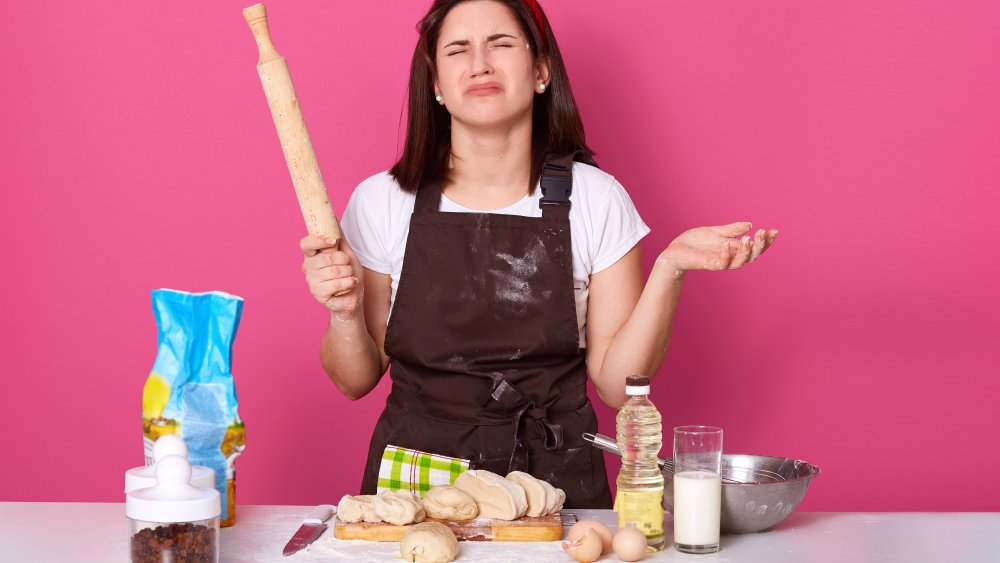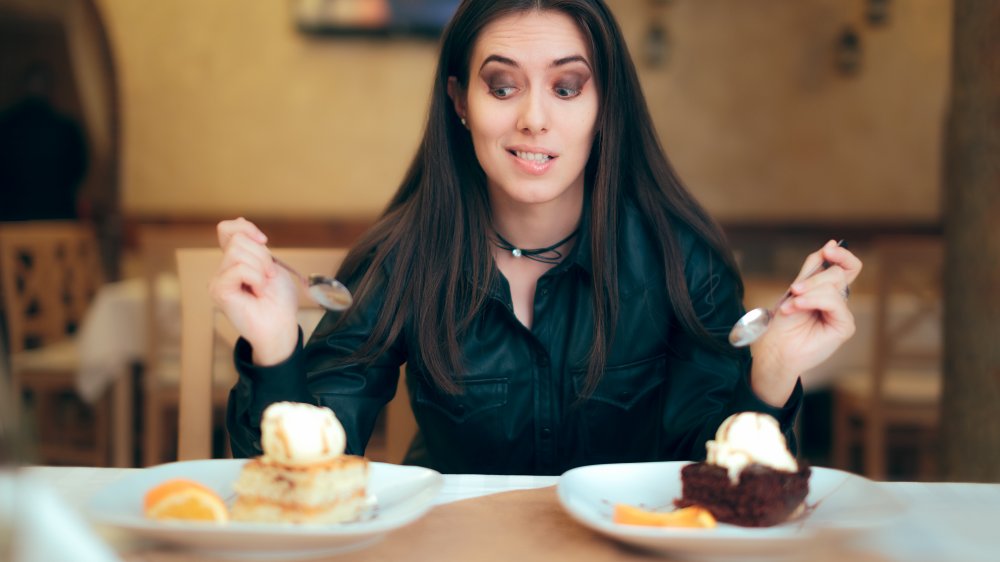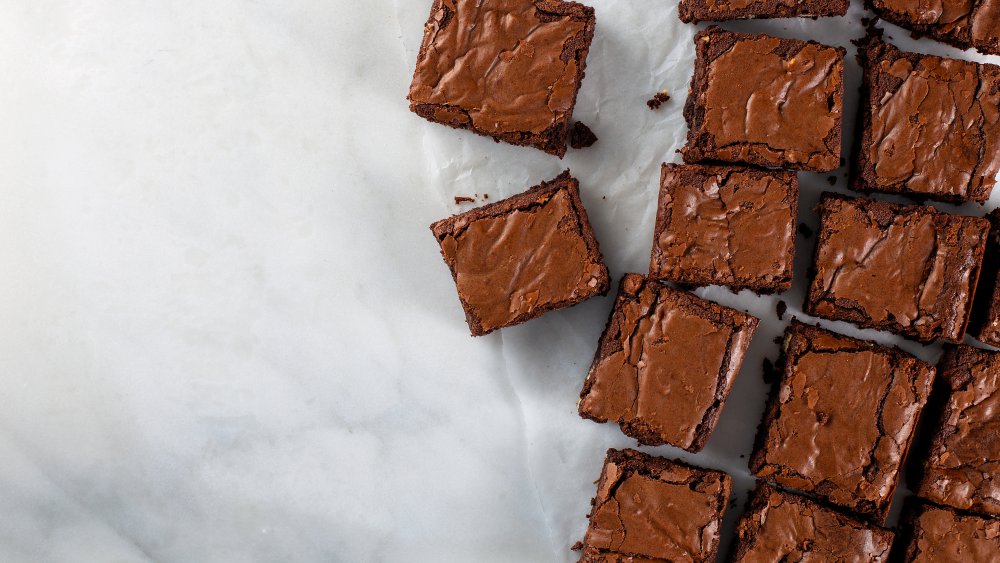Why Baking A Diet Dessert Is A Terrible Idea, According To A Professional Chef - Exclusive
Dessert that someone else has made is the ultimate indulgence, is it not? Whether you're daintily dipping a tiny spoon into a pot of creme brûlée at a restaurant, or wolfing down that hot batch of chocolate chip cookies your neighbor just brought over fresh from her oven, there's a certain decadence in enjoying goodies that someone else has prepared. If you're baking yourself dessert, though, you might feel less inclined to adapt this "treat yo'self" mentality — especially if you tend to be careful about your calorie intake. Measuring out exactly how much butter, sugar, salt, and other not-exactly-diet-friendly ingredients the recipe calls for can be a buzzkill to your sugar high. So it's tempting, for many dieting dessert lovers, to try swapping out some of those more sinful ingredients — plain Greek yogurt instead of cream, for example, or applesauce instead of oil.
But you need to stop, according to Michelin-award winning chef Daniel Kleinhandler, who served as executive pastry chef at Bar Boulud, Aureole, db Bistro Moderne, Picholine, The Clocktower, and Boulud Sud. Instead, Kleindandler, who opened his own own pastry company, sugar, butter, chocolate, earlier this year, suggests that you put down your calorie calculator apps and back away from the Splenda slowly. In an exclusive interview with Mashed, Kleinhandler, who is teaching a virtual cooking class through CocuSocial, on September 13 at 2 p.m. EST, explained that trying to make a dessert "healthy" is not only going to destroy how it tastes, but you'll probably end up killing your diet goals, anyway.
Making substitutions when you're baking rarely works out well, chef says
According to Kleinhandler, the biggest mistake a novice baker can make is "not listening to recipes." He added that baking is very different from cooking, in which substitutions won't usually ruin your meal. "If you're a cook and you don't like ginger, just don't put ginger in the recipe, and you're a good cook and you don't have flank steak, you have strip steak, other than how long it cooks on the stove, it really doesn't make a difference." But baking is very different from cooking, Kleinhandler explained. If you think to yourself, "Oh, I don't want to put that much sugar in there," Kleinhandler said, "Well guess what? It's just not going to work!"
Every ingredient in a dessert recipe has multiple purposes, the pastry chef explained. "Like sugar in a baked item doesn't just make it sweet. It's for texture. It's for stability. It's got multiple layers of purpose," he said. "And if you remove it or too much of it, or don't replace it with something else that can act like it, not only is it not going to be sweet, which is probably most people's goal, it's going to be flat. It's going to not be stable — it's going to be crunchy."
It's important to understand the science behind baking, Kleinhandler emphasized, and to know that sometimes just switching an ingredient won't be sufficient — you may need to do other things to compensate for the more caloric food you've omitted. Kleinhandler regularly fields questions on Instagram from people who are on diets. "Can I substitute? I don't like white sugar and I use Stevia," they will say. Depending on the dessert, Kleinhandler may answer "yes or no, or you have to put it in a food processor first to grind it down."
Trying to make a dessert 'healthy' is bad for your diet
Dessert, by definition, is supposed to be a treat, Kleinhandler pointed out. "Sometimes [trying to make a recipe] healthier can go to the point where it's no longer dessert," he said. When that happens, you'll ultimately walk away from the table dissatisfied. "I don't even like diet desserts because people don't get satisfied with them," Kleinhandler said. "And then if you have to eat two pounds of a diet dessert to feel satisfied, or you're not satisfied, and four days later, you're still going to get the bad dessert. Why are you making healthy dessert?"
So to do the math, passing up on a homemade soufflé — like the dark chocolate soufflé recipe Kleinhandler will be demonstrating during his CocuSocial class – means that you could be saving yourself perhaps 342 calories, going by MyFitnessPal's estimate. Instead, you bake yourself chocolate cupcakes with diet-friendly ingredients, for maybe half that number of calories as a soufflé — but you eat half of them. (Oops!) Later, that treat-wielding neighbor knocks on your door with a plate of her famous cookies, and of course you eat those, too, because you felt deprived. You were "good all week." By Kleinhandler's logic, you would have been better off making yourself a real chocolate soufflé in the first place.
Here's how Chef Daniel enjoys a treat without overdoing his calorie intake
Rather than swapping out sugar for artificial sweetener or getting creative with Greek yogurt or protein powders, Kleinhandler has a trick for enjoying "real" desserts without worrying about weight gain. "I'm a big fan of making brownies and making a pan. Instead of cutting into four-inch brownies, I cut two-inch brownies," he advised. "So you can eat a really, really, really good brownie. Like, 'Oh, I can even have two brownies and it's still a quarter of a half the size of a four inch square,' you know?"
This trick is all about portion control, Kleinhandler added, but there's also a psychological issue at play. "You're going to be satisfied because you had your rich chocolate, but then you also are eating enough food that you're not still hungry," he explained. "Things like that are really the key for me."
Be sure to reserve your spot in Chef Kleinhandler's virtual cooking class on CocuSocial, which will be taught on September 13th.



